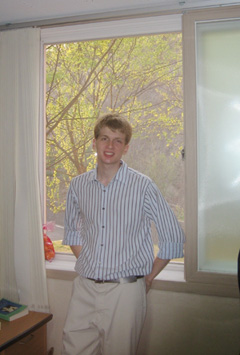 The Gazette would like to introduce Jack Blanchard, an exchange student from the United States of America, through our interview with him. He is studying at the Department of History in Keimyung as an exchange student for one year.
The Gazette would like to introduce Jack Blanchard, an exchange student from the United States of America, through our interview with him. He is studying at the Department of History in Keimyung as an exchange student for one year. 1. Would you introduce yourself?
My name is Jack Blanchard. I’m from Atlanta, Georgia, in the United States. I’m 22 years old and I’m in my fourth year of school at Georgia Southern University as a history major.
2. Why did you choose to study in Korea, and why in KMU?
Korea offered a study program that was unlike most any others offered. If I chose Europe, I would be in a different part of the world, but living in a western society already (the United States), things really aren’t that drastically different. Additionally, I have a few Korean friends back at my home university who have been wonderful to me.
Keimyung was specifically chosen because my school has no other programs in Korea, although, if I were given a choice, I probably would still study at Keimyung because of its large student body, beautiful campus, and its positioning in one of the larger cities in Korea.
3. Could you introduce your hometown and tell us the differences between universities in your country and Korean universities?
My college hometown is Statesboro, Georgia. A great portion of Statesboro is still in use for farming, so it’s an extremely small city. In fact, the population of the city (without the students) is about 3,000 people (with the students, around 18,000.) It’s a very quiet life; we have to drive at least an hour just to reach a moderately sized city.
Comparing universities in Korea and the United States, I’m surprised by how active students are outside of the class, on a group level. While study groups in Korea are very common, most students in the United States will either study by themselves or with a friend.
Time is viewed completely differently here. In the United States, teachers are notorious for beginning class a little early or right at the start time. I’ve noticed that the idea of 3:00 in Korea really means 3:05 or 3:10, while in the United States people typically show up five minutes early at the very least.
Also, dormitory life is extremely different. At my home university, students are allowed into each other’s rooms until a certain time at night, you can go into the dorm whenever you want, regardless of time, and there’s hot water all the time; I think the idea of the university is that we’re, legally, adults. If we are irresponsible it’s our own education we are sacrificing. However, Korean dormitory life is marked by a great deal of control. There is a curfew every night of the week: 11:00 on weekdays, 11:30 on the weekends; hot water is only available during certain times of the day, and you will be instantly removed from the dorm if a student of the opposite gender is in your room.
4 .What was your biggest difficulty when you initially came to Korea?
The most difficult part of Korea for me was during the third month. In the first two months of my experience, everything was new and interesting, customs were something to be learned, food was something to try, language was something to study, but by the third month I was tired of all of these things. I missed home. I was in a city of millions, but the people I could express myself to, fully, in my native language, were limited to two or three. It makes you grow up quickly. After getting over this setback, I looked at Korea differently and it felt like living in the country rather than visiting it.
5. What is your favorite place in Korea?
I visited Gyeongju for a week during my first month of stay in Korea. The Silla capital, with its traditional architecture, was beautiful and full of historical significance. It was the first time I really felt the presence of an old Korea.
6. What do you want to achieve during your stay in Korea and what are your plans for the future?
While in Korea I’ve been trying to gain as many good academic and lifestyle habits as I possibly can. When you’re in a familiar place, it’s easy to get into a routine and do things the ways you’ve always done them; this one year that I’ll be in Korea has given me the opportunity to improve my lifestyle.
My largest concern coming here is deciding what I wanted to do for my career. I finally feel confident enough in my academic ability to go to Law school to become a lawyer. I feel that I owe much of this change of heart to my stay in Korea.
7. Finally, would you say something to KMU students?
Keimyung students, the best thing I can suggest to you is to study abroad. The world is such a large place and you can never fully understand this until you’ve been to a country completely different than your own. Your university provides you with so many opportunities to study abroad; I, of course, recommend the United States, but study somewhere, anywhere. All of us, as college students, have great potential for success: don’t waste this opportunity! Studying abroad gives you the chance to not just learn about a country that you’ve only seen in textbooks, but to discover the potential and talents that you possess.








